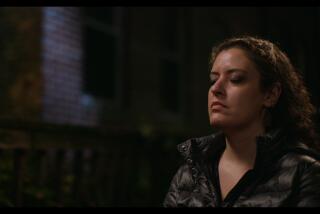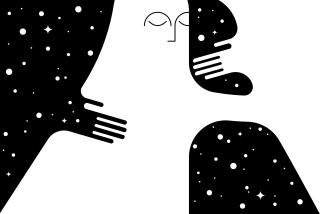THE HUMAN CONDITION / WHY WE THINK WE’RE PSYCHIC : Knocking on the Door of the Supernatural World
- Share via
They have visions that come true.
They know what you’re about to say before you say it.
A convention of channelers, perhaps? A roomful of Shirley MacLaines in a parallel universe?
Nuh-uh. Just a surprising number of otherwise regular people--hairdressers, office managers, travel agents, CEOs--who routinely describe brushes with the paranormal worthy of a segment on “Unsolved Mysteries.”
Like the self-made woman who claims to have visited heaven. Twice.
Or the successful executive who says he can spin mobile sculptures--the kind that balance on a base with a metal point--simply by relaxing and concentrating on “the visual of the thing happening.”
What’s going on here? Why do we all think we have a sixth sense?
You probably already knew we were going to say this, but a lot of it has to do with feeling powerless over the random events that rule our destinies. No wonder we want to embrace the paranormal.
“In those who passionately argue and strive to prove these things, the overriding impulse is control,” says the mergers-and-acquisitions specialist who claims he can do that neat trick with the sculptures. “Self-esteem comes from people’s belief in their ability to control their lives.”
Los Angeles psychic Jim Watson agrees: “People want to control what they can’t control.”
*
According to a Gallup Poll, almost half--46%--of all Americans believe in ESP. Twenty-four percent believe in precognition--predicting the future. Eighteen percent believe in clairvoyance--envisioning something not physically in front of you. And 31% believe in deja vu-- feeling like you’re reliving an experience you’ve had before.
As far as how many people have had a personal brush with these phenomena, Richard Broughton, director of research at the Institute for Parapsychology in Durham, N.C., says his organization has 12,000 cases on file--years’ and years’ worth of ordinary people experiencing extraordinary things.
A typical case, recalls Broughton, describes a woman waking after dreaming a chandelier has fallen on her baby’s crib. Shaken, she gets up and brings the baby into her room.
“Several hours later,” says Broughton, “there’s a crash.” Sure enough, the chandelier has fallen on the empty crib.
“If we wanted to be skeptical, we could find reasons for dismissing these cases,” says Broughton, author of “Parapsychology: The Controversial Science.”
“But there is an overwhelming weight of cases which normal explanation doesn’t cover,” he says.
Maybe so. But even putting aside the controversy over whether there’s such a thing as the paranormal in the first place, 12,000 cases sure seem like a lot of bizarre, unexplained phenomena. It’s enough to make paranormal experiences seems awfully darn normal-- no more a mysterious gift than the ability to smell or, say, opposable thumbs.
*
Exactly, theorizes D.C. Douglas, a Hollywood actor and playwright whose brushes with the weird led him to pen “Artistry of Hell: A Psychic Stripper’s Odyssey Through Dreams, Drugs and the Streets of San Francisco,” which was staged in Los Angeles last summer.
Douglas, who does not claim to be a psychic but does say he’s had psychic experiences, based the play on his sister. He believes psychic ability is sort of equal-opportunity human talent.
“If everything is made up of energy and a thought is energy, everything can be tapped into,” he says. “Everybody has that ability to some extent. But I think my sister is more open to it--she has a stronger antenna.”
Joan Poland, a San Diego homemaker, agrees. “Anyone can be that way if they tap into it. We’ve just begun to scratch the surface of the human mind and what it can do.”
Poland and Douglas, both open to the idea of the paranormal, have had multiple experiences with such phenomena. Nothing earth-shaking, just sort of odd.
Douglas describes waking up in a total panic one night when he first moved to Los Angeles. “It was during the time of the Night Stalker,” he says, referring to serial killer Richard Ramirez, who terrorized the city one summer during the mid-1980s.
“I was living alone, and I was terribly lonely. One evening, I went to sleep. I used to leave the door open and the screen closed. At 3:45 a.m., I woke up in amazing fear--the kind where you’re so scared you can’t move, because the minute you do move, you realize your fear is well-founded.”
Douglas finally gave in, got up and locked the front door. “The next night I was watching the news and I saw that the Night Stalker had struck in Orange County--at 3:45 a.m.”
*
“What happens to me,” says Poland, “is that I’ll go somewhere or meet somebody for the first time, and I know it has already happened.” Then she’ll realize she has dreamed about the experience in the past, only she hasn’t recalled the dream until that moment. “It’s like a movie you’ve seen before, and you don’t remember seeing it,” she explains.
Like Douglas, Poland believes that psychic ability is partially hereditary. Her grandmother once had a dream in which her deceased husband--Poland’s grandfather--told her about a treasure he’d stashed in a secret compartment in their home. Poland’s grandmother woke up, followed his “directions” and unearthed a cache of silver dollars.
Poland’s daughter, Stacey, has also had dream premonitions. “When I was in the sixth grade, I had a dream about being in an apartment, and these girls coming up to the door asking for ‘Carrie,’ and my mom saying, ‘There’s no Carrie here, but there’s a Stacey.’ ” In the dream, Stacey remembers, she said to the three girls, “I’ve dreamed about this.”
About a year later, Stacey’s family moved into an apartment, and, Stacey swears, that exact scenario took place. “They ended up being my best friends,” she says of the three girls. “I think the reason I dreamed about them is because they were destined to be important in my life.”
*
Such reasoning is common, but false, says Ray Hyman, a professor of psychology at the University of Oregon and a vocal skeptic.
“People have these experiences all the time. The experiences are real, but they don’t have to do with the paranormal,” says Hyman. Sorry, but most of these experiences are easily reasoned away with garden-variety science, he says.
Of dreams or thoughts that come true, the explanation is simple. “If you think about how many thoughts you have during the day--thousands of times every day--the fact that some of these actually come true is not surprising at all,” says Hyman, who doesn’t believe in psychic phenomena. “In studies of memory, you find people only remember those things that have consequence. Thoughts come and go. If nothing happens within 24 hours or so of a thought, that thought is gone.”
Hyman says if you think about your long lost Uncle Mo, even for a second, and a day later your Uncle Mo actually calls, you’re going to remember he’s been on your mind. But, alas, you and your uncle don’t have a mysterious psychic bond.
It’s merely intuition, says Jim Watson, of the Metaphysical ESP Center in Los Angeles. Watson, a working psychic who has been called upon to solve murder cases and locate missing children, differentiates between his level of ability and that of non-psychics. “There are Cadillacs and there are Chevys,” he explains.
“My secretary, who is my friend, said to me, ‘I can think about my mom, and my mom will call me. Do you think I’m psychic?’ ” Watson said no.
“That’s not a psychic experience, that’s intuition. I actually look into the future.” Intuition, Watson says, “is looking into the next three seconds.”
*
The bottom line, says psychic Watson: If you think you’re psychic, you’re probably not. If you think you’ve had a psychic experience, you may have, but you probably haven’t.
He calls Stacey’s dream about the three girls “a weird coincidence.” Joan’s grandmother’s dream about the silver dollars sounds like a psychic experience, he says, but that still doesn’t make her psychic. “There’s a total difference.”
Adds Broughton of the Institute for Parapsychology: “If this ability is like other abilities, we should find it widely distributed.”
On the other hand, he cautions, “When the lay person says, ‘Oh, I’m psychic,’ when they describe what they mean by psychic, it often turns out the guy’s a little soft on coincidence.”
More to Read
Sign up for Essential California
The most important California stories and recommendations in your inbox every morning.
You may occasionally receive promotional content from the Los Angeles Times.










